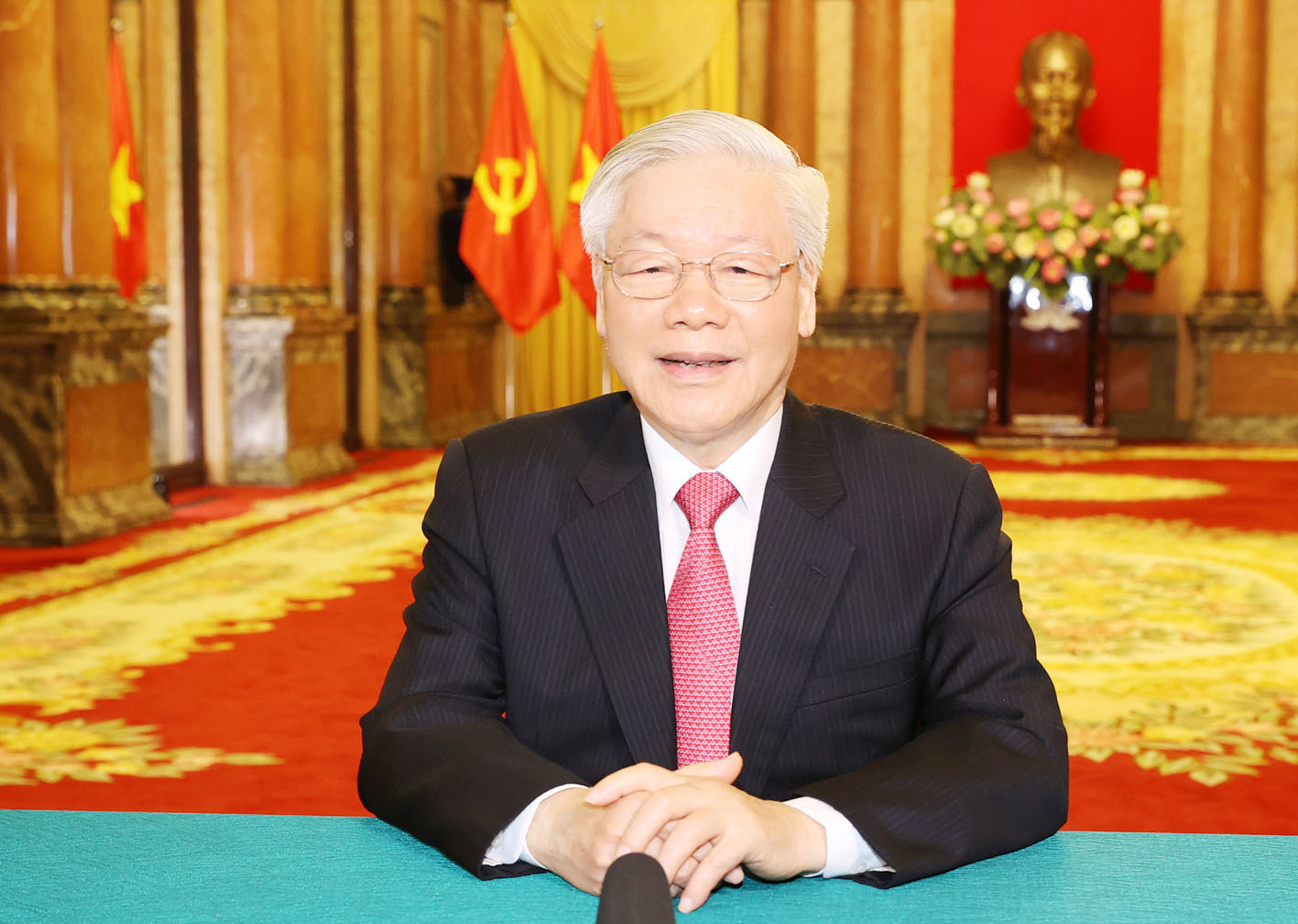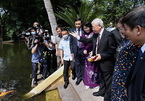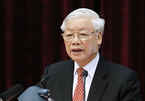 |
|
Party Secretary General and President Nguyen Phu Trong
|
Innovation in personnel work
Reviewing the 12th National Party Congress tenure, the Communist Party of Vietnam (CPV) has spent a lot of time and effort to build a "cage of mechanisms" to "lock up power".
In the first year of this term, in November 2016, the Party Central Committee issued the Resolution of the 4th Central Committee, 12th tenure on “Strengthen Party building and regulating; prevent and reverse deterioration of political ideas, ethics, lifestyle, 'self-evolving' , 'self-transformation' expression within the Party”.
In this Resolution, the Central Party Committee pointed out four groups of solutions, including a very important one - "controlling power, locking power in the cage of mechanisms".
The issue of "locking power in mechanisms" continues to be set by the Party in Resolution 26 of the Central Party Committee dated May 19, 2018 on "Focus on building a contingent of cadres at all levels, particularly the strategic level, with sufficient qualities, capabilities and prestige, on par with their duties and missions."
Among the four specific targets up to 2020 of this Resolution, the Central Party Committee set the first goal of institutionalizing and concretizing the Resolution into the Party's regulations and the State's policies and laws on personnel tasks, and building and managing officials.
The next is to perfect the power control mechanism; be determined to eliminate the phenomenon of “getting promotion and power through solicitation and bribery”; prevent and repel recession, "self-evolving", "self-transformation" among cadres and party members.
Resolution 26 is considered the "backbone" of the "cage" of mechanisms on personnel work to gradually realize the "locking of power in the cage of mechanisms".
Since then, under the direction of the General Secretary, President Nguyen Phu Trong, the Central Organizing Committee has advised and built many documents to submit to the Party Central Committee, the Politburo, and the Secretariat for issuing many regulations to "confine power in the cage of mechanisms".
These are also the regulations aimed at building "a 13th Central Party Committee to be truly united, clean and strong" as expected by the General Secretary and the President.
Control power, fight against bribery
On October 25, 2018, the Central Party Committee issued Regulation 08 on the responsibility on setting example of cadres and party members, firstly members of the Politburo, members of the Secretariat, and members of the Central Party Committee.
The Central Party Committee asked the Politburo members, members of the Secretariat, and members of the Central Party Committee to be examples in implementing 8 contents; to be strict with themselves and to be determined to fight against 8 groups of behaviors.
|
Eight groups of behaviors that Politburo members, members of the Secretariat, and members of the Central Party Committee must be strict with themselves and resolutely fight against: 1. Individualism, localism, personalism. Taking advantage of the collective to avoid responsibility or taking the name of the collective to realize individual purposes. Speaking inconsistently, speaking not going along with actions, speaking more, but doing less. 2. Be autocratic, bureaucratic, away from the people, indifferent to the people's difficulties and frustrations. Prejudice against commenters and critics. Directly or indirectly, or providing materials for others to speak, write, post false news in order to enhance oneself or his/her organization or to lower the reputation of other organizations and individuals in the media and social networks. 3.To assume the prime responsibility for advising, promulgating mechanisms and policies contrary to the Party guidelines, the laws of the State, affecting the Party's reputation or causing harm to the interests of the state, organizations and citizens. 4. Taking bribery for power and promotion, for ballots and votes of confidence or lending a hand to these acts. Making illegal intervention in personnel work; promote, appoint and arrange cadres who do not meet the prescribed criteria and conditions, especially for family members and relatives. 5. Corruption, bribery in any form; give gifts, receive gifts for self-interest. Make intervention without proper authority, responsibility, or regulation in the inspection, auditing, investigation, prosecution, adjudication, judgment execution; in proposing, undertaking, appraising, approving, bidding, appointing contractors for socio-economic, defense-security projects; auction of land, state property. 6. Wasting public funds, property, means, human resources and working time. Organizing business trips at home and abroad not in accordance with the composition, time and content of job requirements. Have a luxurious and wasteful life, lifestyle, consumption and entertainment. 7. Taking advantage of businesses or letting businesses take advantage of for self-benefit. Abusing positions, powers and prestige to illegally borrow money, property or means of organizations or individuals. 8. Letting spouses, parents, siblings take advantage of their positions, powers and prestige for personal gain. Letting spouses, natural children and adopted children to live lavishly or fall into social evils, violate the law. |
|
On September 23, 2019, the Politburo issued Regulations 205 on controlling power in the personnel work and fighting against bribery for power and promotion. Regarding the control of power in the personnel work, the Politburo strictly forbids five acts as follows: 1. Providing or disclosing information, documents, personal records of party members and cadres to organizations and individuals who are not authorized or responsible. 2. Interfering personal intentions, setting out criteria, standards, conditions, comments, assessments that are imposing, not true to the nature, not true to the truth to seek benefit or benefit cadres while performing personnel tasks. 3. Letting others, especially their family members, take advantage of their positions, powers and prestige to manipulate or intervene in the personnel work. 4. Meeting, contacting and exchanging with personnel in contravention of regulations in the process of implementing personnel work. 5. Bribery for power, promotion or lending a hand to these acts. |
The Politburo clearly stated six acts of bribery for power, promotion and eight acts of covering, assisting the briber for power and promotion. Officers and party members who violate these acts, apart from being handled according to regulations, are also subject to other punishment measures corresponding to the disciplinary levels.
Specifically, those who are reprimanded will be removed from the promotion plan for at least 18 months. If they are serve MD a warning, they may be removed from positions in the Party committee and their current positions and from the promotion plan for at least 30 months.
If they are dismissed, they will be removed from the promotion planning for at least 60 months.
Those who belong to the three above cases are not assigned to advisory tasks related to organizational, personnel, inspection works.
In the case of being expelled from the Party, they will face termination of the labor contract or have to quit the job. If they are related to giving, receiving bribes or other acts of violation that are subject to criminal prosecution, their cases must be transferred to relevant agencies for consideration and handling in accordance with the law, not only handled by administrative measures.
On February 2, 2020, the Politburo issued Regulation 214 on the standard for titles, criteria for evaluating officials who are managed by central agencies, the Politburo, and the Secretariat.
In addition to the general standards of ideological politics; morality, lifestyle; level; capacity and reputation; health, age, and experience, Regulation 214 sets out the specific criteria for each title, including those for members of the Central Party Committee, the Politburo, the Secretariat, the Party General Secretary, the President, the Prime Minister, and the Chair of the National Assembly.
|
Criteria for admission to the Central Party Committee: 1. Members of the Central Party Committee must be a representative of the Party in terms of political bravery, ethical qualities, and working capacity. Criteria for an alternate member of the Central Party Committee: 1. Must be young officials; basically meet the standards for a member of the Central Party Committee Criteria to be a member of the Politburo and the Secretariat: To meet the standards of a member of the Central Party Committee, at the same time there should be additional standards: 1. Truly typical and exemplary in terms of political bravery, moral qualities, intelligence, will to fight, leadership and management capability, sense of organization and discipline; not influenced by outside interference, pressure and group interests. |
More than 200 strategic level officials receive training
There is also Directive 35 of the Politburo on the Party Congress at all levels towards the 13th National Party Congress. In particular, the Politburo requested that the personnel working for the term 2020 - 2025 must ensure the principle that the Party unifies to lead the personnel work and manage the cadres, directly members of the Party Central Committee, the Secretariat, Party leaders.
Party committees at all levels of the 2020 - 2025 tenure must attach special importance to quality, with reasonable quantity and structure; typical in terms of intelligence, quality, prestige, truly pure, strong, capable of leadership and having fighting strength, meeting the leadership requirements in the new situation, successfully implementing the resolutions of the Party Congress at all levels and the Resolution of the 13th Party Congress.
The Central Party Committee also issued guidance dated March 20, 2020 on a number of specific issues to implement the Party's Electoral Regulations. The instructions clearly state that the person who nominates personnel to join the party committee must be responsible before the congress for the standards and conditions for those they nominate.
After the congress, if it is verified that the nominee does not meet the criteria and conditions as prescribed, depending on the seriousness of the violation, the nominee will be considered for punishment according to the Party's regulations.
Since October 2019, the Central Organizing Committee and the Ho Chi Minh National Academy of Politics have coordinated to organize five classes of fostering new knowledge for more than 200 officials who are named in the promotion planning at strategic level of the 13th tenure.
The first and second classes took place in October 2019 with 95 members; the 3rd and 4th classes took place in early March 2020 with 86 members (74 male and 12 female), most of them were born in the 1970s and the youngest was born in 1983.
The 5th class just ended on September 15th with 41 members (33 male, 8 female). Twenty of them are working at ministries and central agencies and 21 are working in central agencies of cities and provinces.
Thu Hang

The people and the ruling party's measure of value
"In all works of the Party and State, the people are always defined as the root," Party Chief and President Nguyen Phu Trong wrote in his article about the work that needs to be done for the 13th National Party Congress.

Prepare and organize the National Party Congress well, bring the country into a new stage of development
VietNamNet would like to introduce an article by Party General Secretary and President Nguyen Phu Trong, entitled “Prepare and organize the National Party Congress well, bring the country into a new stage of development".